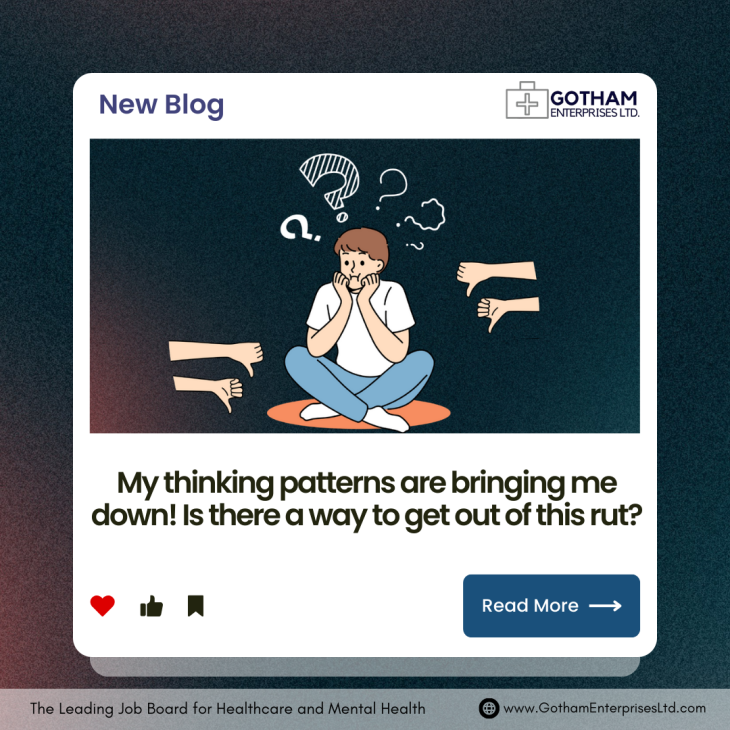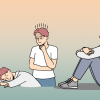Recent Posts
- I broke up with my partner, but now I am having doubts. Did I do it out of the right reasons or was I just being fearful?
- My Quick Temper Pushes People Away. What Do I Do To Manage My Anger?
- How does noise affect my mental health?
- I want to be a better problem solver. What is a step by step approach?
- Escapism. When is it healthy? When is it damaging?
Most Popular
My thinking patterns are bringing me down! Is there a way to get out of this rut?

My mind wanders to what might be. Then thoughts turn to worries. The next thing I know, I am already replaying negative scenarios in my head, and then I am gripped by intense fear. Honestly, being inside my head is tiring. But I can’t seem to stop these thoughts!
This is an example of having negative thought patterns.
In 2018, A study where 643 college students were asked to answer a questionnaire about negative thinking and researchers found that it was highly related to symptoms of depression and anxiety. Moreover, negative thinking is linked to higher risk of having unwelcome thoughts and having low enjoyment of the present.
Thinking of risks and possible dangers come in handy when we make daily decisions, but when these thoughts go out of hand, they can get more powerful and end up putting us at risk for anxieties.
Negative thinking can be in the shape of distorted self-doubt and criticism, wrong assumptions and twisting reality and the best way to break free from this habit is to learn healthy coping strategies.
Forming healthy thinking habits by recognizing old thinking patterns
Identifying thinking patterns is a skill, but since we experience them daily, we can note our own habits and eventually replace them.
- Overthinking
Scrutinizing every last possible detail about our thoughts and foreseeing every potential result repeatedly and not being able to make a decision afterwards is a form of overthinking. We get stuck in just replaying every angle and making up possible scenarios until we are fatigued.
- Hostility
Do we find ourselves believing that people are inherently untrustworthy or just evil? It manifests in our anger against others, often without a logical basis. This feeling of hostility increases some more as we judge the person and the situation from multiple negative perspectives.
- Rumination
Rumination is the habit of examining ourselves, but in a negative light, dismissing the positive aspects. We think about ourselves and the future and see only the worsening of our situation because the factors that we consider are negative ones.
- Dichotomous thinking
It means thinking only in black and white. We see the situation in one perspective only-the negative one. We commit a mistake and we see ourselves as a total failure. We get second place at something and we think we are insignificant and label ourselves as losers. This type of thinking does not allow space to consider other perspectives.
- Mental Filter
Out of all the many aspects of a situation, we choose only one aspect and give our 100% focus on that one thing–especially a negative one- that eventually makes us think that we are already defeated and lose hope.
- Self-blame
We see ourselves, our feelings or our actions as the reason for a negative scenario. We focus on the part we played in that event, even when in reality, that situation may not be about us.
There are many other common negative thinking habits that are common and when we catch ourselves doing any of these thinking habits, it is time to employ alternative and healthier thinking patterns.
What causes negative thinking?
There is no single definite reason, but it is definitely driven by a multitude of factors such as the makeup of our brain and its need to evaluate risks for survival, exposure to too much negative news on social media, our past traumas and history, and our current stress levels.
What can we do to stop thinking negatively?
- Challenge your thoughts.
Not every thought that we think is welcome and helpful. Asking ourselves these questions when we catch ourselves thinking negatively can be beneficial in raising our self awareness.
- Are these thoughts helpful or hurtful?
- If I continue thinking this way, will it be beneficial for my relationships?
- Do these thoughts help me improve my mental health?
- Learn to face these thoughts honestly but without believing immediately that they are true.
- Scheduling when you will entertain them might help you control when they can worry you. This can be done by journaling them at a set time of the day. You get to acknowledge them, but then move on afterwards.
- Face these thoughts with compassion for yourself.
Research has shown that being too critical of ourselves is a driver for lack of self care. By replacing negative thoughts with compassionate words, we think and feel what we see but lessen the stress they bring.
- Seek support.
- If we have friends we express our thoughts to, they might have noticed the quality of our thinking patterns already. Ask them and share your challenges. They might be able to help you regulate your thoughts with you.
- Learn from professionals. Licensed therapists, counselors or psychologists can be great resources for healthy thinking habits. Contact one you trust.
On some days, loving yourself might be hard to do, but self-care that starts with caring for your mind and thoughts will definitely bring you rewards both in the present and in the days to come!







Comments